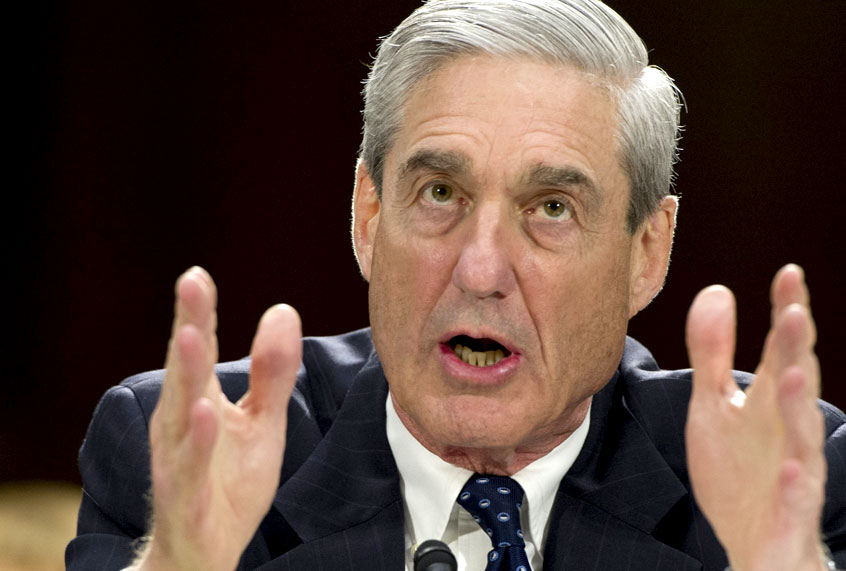President Donald Trump reportedly told White House counsel Don McGahn that he was not concerned about special counsel Robert Mueller’s investigation because he could always just “settle” with Mueller, according to a new book by New York Times reporter Michael Schmidt.
“At one point, as the investigation seemed to be intensifying,” Schmidt says, according to an excerpt reviewed by Axios, Trump told McGahn there was “nothing to worry about because if it was zeroing in on him, he would simply settle with Mueller. He would settle the case, as if he were negotiating terms in a lawsuit.”
It’s one of a number of potentially explosive claims in Schmidt’s forthcoming book, titled “Donald Trump v. The United States,” which will officially be published on Tuesday. Schmidt covered the Russia investigation extensively for the Times, and his early reporting on the probe won a Pulitzer Prize.
Per Axios, Schmidt’s book is based on an array of documents obtained from Mueller’s office, the FBI, the White House and Trump’s personal legal team, as well as hundreds of hours of conversations with current and former officials and others involved in the investigation. It is not immediately entirely clear why these reports, many dating back as far as three years, made it into the pages of Schmidt’s book rather than the subscription-based newspaper that employs him.
In a New York Times article adapted from his book, Schmidt reported Sunday that former Deputy Attorney General Rod Rosenstein blocked Mueller from investigating Trump’s personal financial ties to Russia.
“[L]aw enforcement officials never fully investigated Mr. Trump’s own relationship with Russia, even though some career FBI counterintelligence investigators thought his ties posed such a national security threat that they took the extraordinary step of opening an inquiry into them,” Schmidt reports. “Within days, the former deputy attorney general Rod J. Rosenstein curtailed the investigation without telling the bureau, all but ensuring it would go nowhere.”
Schmidt’s article was met with pushback from Mueller prosecutor Andrew Weissmann, who said that the story was “wrong” in its allegation that Rosenstein authored a secret DOJ order barring a counterintelligence investigation “without telling the bureau.”
“Dozens of FBI agents/analysts were embedded in Special Counsel’s Office and we were never told to keep anything from them,” Weissmann, who is publishing his own insider account of the investigation, tweeted on Sunday.
“Also erroneous is NYT claim ‘Rosenstein concluded the FBI lacked sufficient reason to conduct an investigation into the president’s links to a foreign adversary,'” Weissmann added, supporting the claim with the text of Rosenstein’s memo appointing Mueller, which broadly assigned to him “any matters that arose or may arise from the investigation.”
Schmidt, who won a Pulitzer in part for breaking the news that Trump asked former FBI Director James Comey to pledge his loyalty and close the investigation into former national security adviser Michael Flynn, also writes that the day after Trump fired Comey, he called John Kelly, at the time secretary of Homeland Security, to offer him Comey’s job.
“But the president added something else — if he became FBI director, Trump told him, Kelly needed to be loyal to him, and only him,” Schmidt writes in his book, offering further insight into the president’s intent when he fired Comey — and before Mueller took over — a question that factored heavily into Mueller’s assessment of whether Trump committed the crime of obstruction of justice.
Schmidt says that Mueller never learned about this event because Trump’s legal team sealed off his two-hour interview with Kelly. Schmidt has not made clear when he himself learned this information, which would likely have been brought into account as evidence of potential wrongdoing against Trump.
“Kelly immediately realized the problem with Trump’s request for loyalty, and he pushed back on the president’s demand,” Schmidt adds. Kelly said would pledge loyalty to the Constitution and the law, but not to Trump, according to Schmidt.
“Mueller apparently knew a great deal about what had gone on inside the White House as Trump had tried to control, frustrate, and end the Russia investigation,” Schmidt writes. “I thought — but was not entirely sure — that one of the main reasons Mueller knew so much was McGahn.”
However, Schmidt’s new book implies that he himself might have learned more about what went on in the White House than Mueller did.

